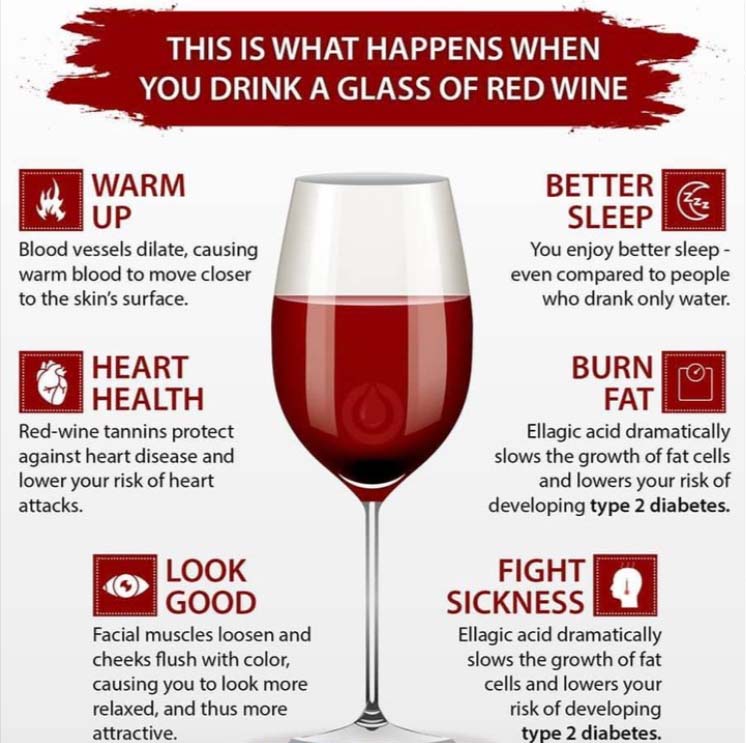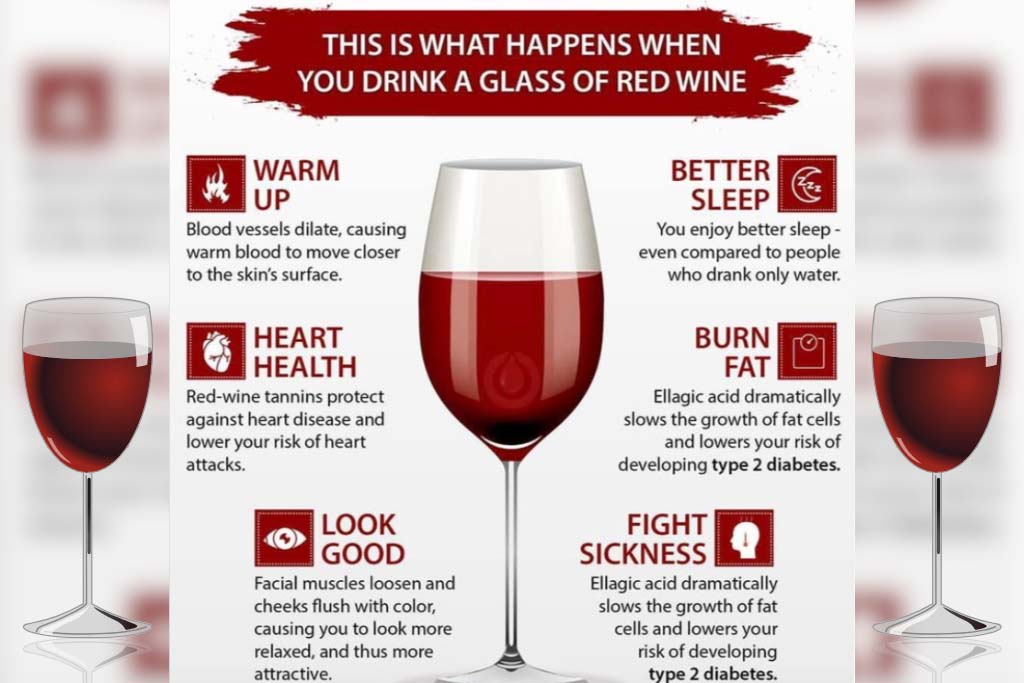The appeal of red wine as an elixir for several health advantages has captivated the imaginations of many in the era of wellness trends. The online meme that has been making the rounds on social media platforms has generated curiosity and conversations about anything from better sleep and weight loss to possible heart health benefits. On a closer look, however, a more complex picture of the health benefits of red wine becomes clear.
Historical Symbolism and Contemporary Beliefs
Ancient civilizations like the Georgians held red wine in high regard. They personified it in the divine forms of the Greek god Dionysus, the Roman god Bacchus, and the Egyptian god Shezmu. This is when the mystery surrounding red wine began. Red wine has a mythical reputation today as a healing potion that can cure all ailments.
Social Media Buzz and Health Inquiries
Red wine’s potential health benefits are called into doubt by an image that has been making the rounds on social networking sites including Facebook, Instagram, LinkedIn, X (previously Twitter), and Pinterest. The promises include treating Type 2 diabetes, encouraging better sleep, warming the body, strengthening the heart, and boosting attractiveness. Even though these claims seem alluring, customers need to be aware of the restrictions and possible negative effects of drinking red wine.
Breaking Down the Claims

Warm Up
Red wine is said to warm you up because, according to the image above, it causes “blood vessels dilate, causing warm blood to move closer to the skin’s surface.” Your blood vessels will undoubtedly dilate after drinking red wine. The European Society of Cardiology discovered in 2000 that the alcohol molecule ethanol, which is also present in beer, liquor, and other wines, caused the brachial artery to expand and enhance blood flow.
However according to a 1994 study that appeared in the Journal of Wilderness Medicine, alcohol “acts as a poikilothermic agent [causing inability to regulate core body temperature], causing a reduction in body core temperature during cold exposure,” which suggests that the feeling of warmth experienced after drinking may not always be genuine. A person’s body weight and the severity of the cold are only two examples of the many variables that affect how strong the poikilothermic impact of alcohol is. The same 1994 study also discovered that alcohol reduces the body’s capacity to shiver, which is a crucial process for producing body heat.
Heart Health
According to the image, “red wine tannins lower your risk of heart attacks and protect against heart disease.” Although red wine may contain some antioxidant molecules with “cardioprotective properties,” the data is too weak to assess this as true with confidence.
As stated by Dr. Kenneth Mukamal, an internist at Harvard-affiliated Beth Israel Deaconess Medical Center, the data supporting red wine—or alcohol in general—as a preventative measure against heart disease is “pretty weak,” according to a 2020 post on the Harvard Health Blog. A 2017 study published in the scientific journal “Circulation” found that while many studies have found benefits for the cardiovascular system, “there is one important caveat: most of these investigations, although involving large sample sizes with cross-cultural and geographical comparisons, were epidemiological,” meaning that they were more concerned with the relationship between alcohol and disease causes than with the benefits of alcohol itself.
The skin and seeds of grapes contain resveratrol, a naturally occurring molecule that functions as an antioxidant and may have cardioprotective effects, according to a 2018 study published in “Biomedicines.”
But Dr. David Sinclair, a Harvard Medical School genetics professor, also discusses the resveratrol content of red wine in an earlier blog post, noting that “you would need to drink a hundred to a thousand glasses of red wine to equal the doses that improve health in mice.”
Look Good
This statement, “facial muscles loosen and cheeks flush with color, causing you to look more relaxed, and thus more attractive,” is completely arbitrary and devoid of any supporting evidence from science. But since alcohol is a depressant, meaning it slows down the central nervous system, it can help you relax your muscles. In addition, some people may feel what’s known as an “alcohol flush reaction,” which is a reddening of the face.
Also, Read:
Better Sleep
The assertion goes as follows: “You enjoy better sleep – even compared to people who drank only water.” Although alcohol depresses the neurological system and can help you fall asleep more quickly, a 2018 study discovered that excessive alcohol consumption or frequent alcohol use over extended periods might interfere with typical sleep patterns later in the night.
This is because alcohol, although initially sedative, turns into an activator throughout metabolism, impeding deep sleep. Researchers discovered that those with alcohol addiction or misuse had “chronic sleep disturbance, lower slow wave sleep, and more rapid eye movement sleep than normal, that last long into periods of abstinence and may play a role in relapse.” Furthermore, alcohol and spirits in particular function as diuretics, which means they increase the amount of urine produced, disrupting sleep.
Burn Fat
According to the image, red wine helps burn fat because it contains ellagic acid, which significantly reduces the formation of fat cells and lowers the risk of Type 2 diabetes. It is not true what this says. When discussing whether or not red wine “makes you skinny,” we have previously mentioned a 2010 Harvard research that revealed women who drank wine nonetheless gained weight—though not as much as those who did not. The study, according to what we discovered, “in no way indicated that wine helped with weight loss.”
This may be a widespread myth since research using mice has demonstrated that the resveratrol content of grapes can cause weight reduction by changing white adipose tissue (a kind of fat) into metabolically active brown fat (burns energy). Additionally, peanuts, chocolate, and some berries contain resveratrol. For instance, grape juice would have the same quantity of resveratrol without any alcohol. “Red wine is a source of resveratrol, but it carries side effects such as being highly concentrated in calories and alcohol,” said the American Institute for Cancer Research.
Fight Sickness
The graphic suggests that red wine may be used to “fight sickness,” citing the fact that “ellagic acid dramatically slows the growth of fat cells and lowers your risk of developing Type 2 diabetes.” Although it is partially true that alcohol use can lower your chance of developing diabetes, excessive alcohol use can also raise your risk.
Red wine contains ellagic acid, which has antibacterial properties. One small drink per day for women and two for men is considered moderate drinking, according to the American Diabetes Association, which can also “improve blood glucose (blood sugar) management and insulin sensitivity.” Alcohol users may be more susceptible to low blood sugar, though, if they also use diabetic drugs such as sulfonylureas and insulin.
Also Read:
WHAT IS ROMANCE SCAM: READ HOW IT LED A TEACHER TO SUICIDE
Conclusion
The appeal of red wine’s health advantages endures, but closer inspection shows that the assertions could be more fiction than truth. Customers are advised to view these health claims with suspicion and seek the counsel of medical experts for specific guidance. The spreading image propagates a narrative about red wine’s health advantages that begs for examination and emphasizes the value of evidence-based health information.
